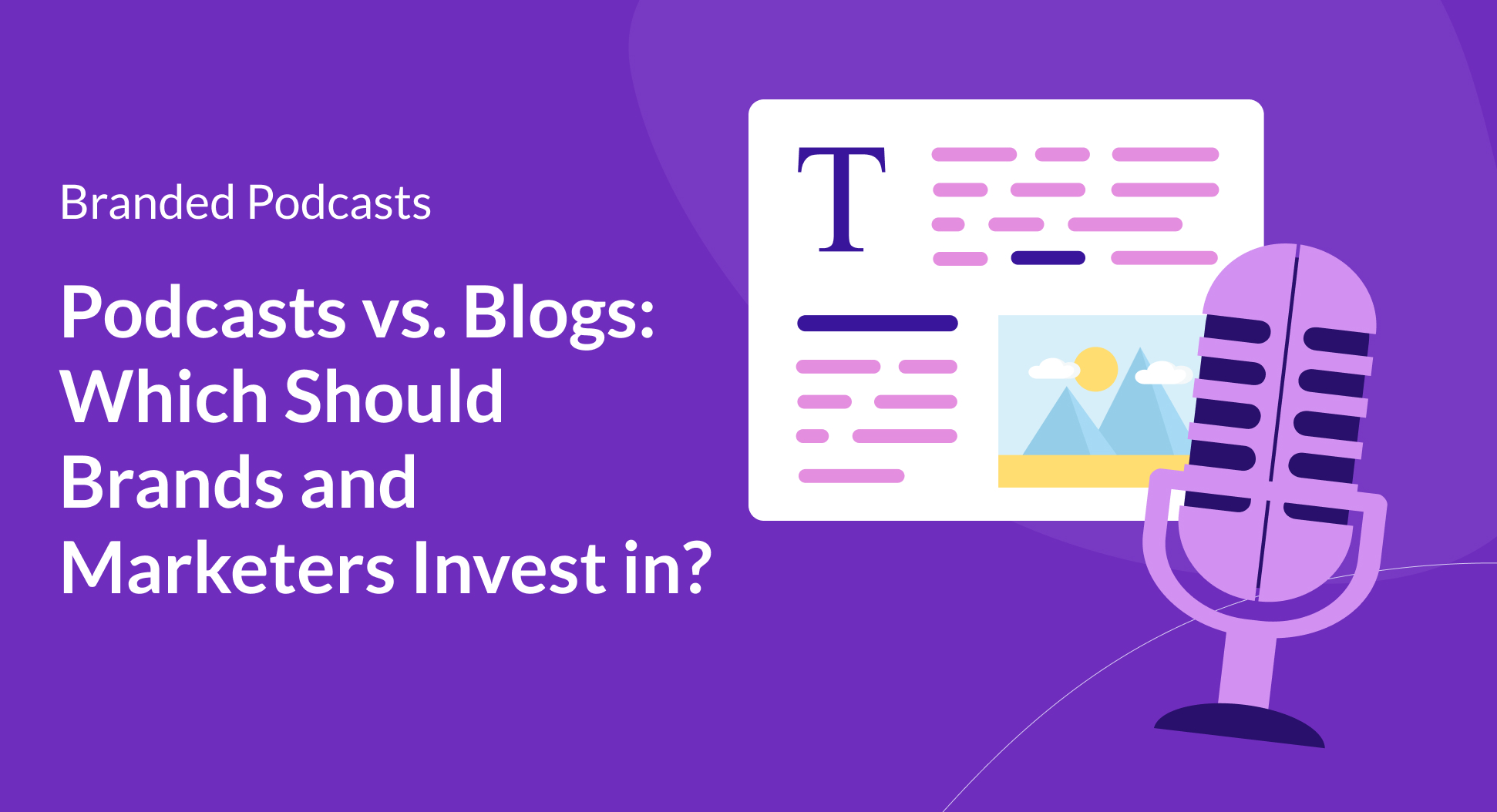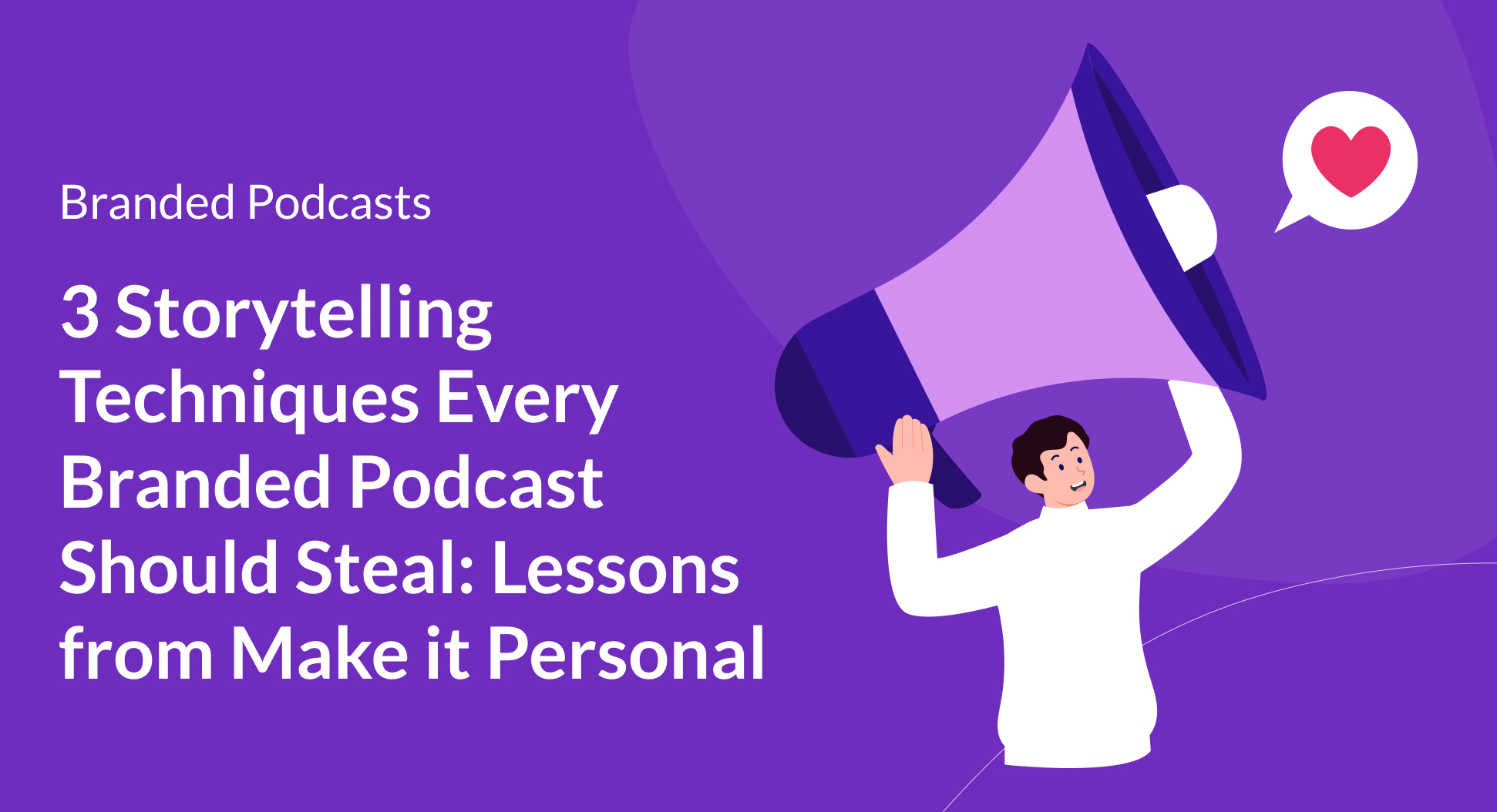Contents
There are plenty of marketing tactics that companies include in their stack, everything from blogging, social media, email marketing, videos, infographics, webinars, white papers, online communities, and of course podcasting.
These mediums take on different channels and formats where businesses can distribute their content to reach and engage their audiences.
These tools, especially podcasts, create an impact on these companies. However, when it comes to podcasts specifically, measuring the real business value of your podcast can be challenging but it’s not impossible.
Identifying your branded podcast goals
There are a few different goals to consider when assessing the effectiveness and impact of your podcast on your business for instance brand awareness, lead generation, thought leadership, brand perception partnerships, and customer engagement.
Let’s dive into each of these different areas and understand how they help measure the real business value of your podcast.
1. Boosting brand awareness through podcasts
Brand awareness is a goal for many podcasters and for good reason! Even if it’s not the main goal behind your investment, increased awareness is a great sign that positive things are happening, and more people know about your business and offering.
Awareness can also mean increasing the visibility of your other channels, like social media or your website through the podcast. Having more eyes and ears on your content means whatever investment you’ve made is making an impact.
Use metrics like downloads or if you want to get more specific and accurate numbers, unique listeners, to measure the ROI for podcast awareness.
2. Lead generation in branded podcasts
Historically, attributing leads to your podcast was nearly impossible unless you had a “how did you hear about us” in your sign-up process or listeners clicked on your website from a UTM link in your show notes.
But brands can now leverage B2B analytics to boost lead generation efforts since you now know what companies are sitting at the top of your sales funnel. Brands can export the data from their B2B Analytics dashboard such as company, size, industry, and revenue, and pass that along to their sales team for prospecting.
You can also start tracking these prospects through your sales funnel. First, you see them become listeners of the podcast, and then you can offer a gated piece of content in your show notes and see them download it, after this, they sign up for your newsletter.
For example, if you notice that the companies listening to your show are primarily in one of the industries your brand targets like banking, create a downloadable template that you know would solve a pain point for those working in banks and mention it in the podcast.
You’re now nurturing leads and providing value beyond your podcast without blatantly making a sales pitch. It’s the best way to sell because you’re directly speaking to bankers and the problems that keep them up at night.
3. Cultivating thought leadership
When it comes to establishing yourself as a thought leader in your industry, measuring your success can be a bit tricky. However, there are a few key metrics you can use to gauge how well you’re doing. Keeping an eye on unsolicited media mentions that reference or tag you can be a great sign that you’re gaining traction and building a reputation as an industry authority in an organic way.
Another good metric to look at is how often you’re invited to participate in industry events like talks, podcasts, conferences, and lunch and learns. Being asked to share your expertise and opinions at these events shows that people value your perspective and see you as a credible source of information.
4. Brand building and perception
Building a brand is another way of categorizing awareness, brand affinity, loyalty, and trust.
The idea is that people know you exist, people are drawn to your brand and like it, your audience feels loyal to you vs. competitors and listeners trust you and can count on your quality and mission.
Podcasting helps yield all of these things if you present yourself in an authentic and valuable way to your listeners. While “brand building” is a direct ROI of podcasting, it’s also one of the hardest to track.
You could set up an NPS (Net Promoter Score) and track how the score changes from before podcasting to after, or you could run a brand sentiment analysis. But in most cases, you’ll simply need to trust that with each episode and each new guest interview, you’re building awareness, affinity, loyalty, and trust with your listeners.
Think about when a host or guest from a podcast you regularly listen to endorses a product. Instantly, you build a sense of trust for that product because you respect the host or guest.
And because you listen to them endorse this product multiple times, the brand is top-of-mind when you’re faced with a problem that the product solves.
The same thing happens to the people who listen to your podcast or your guest interviews. You have to trust the process and power of podcasting as a brand-building channel over time.
5. Cultivate partnerships and relationships
While likely not the main goal of most investments into a business podcast, it’s important not to underestimate the value of the connections and relationships that can form through podcasting.
Whether these connections be with other creators or with your audience, knowing that your podcast is resonating cannot be undervalued.
Forming connections is also an indication of your podcast’s visibility and engagement, and these connections have the potential to form mutually beneficial relationships with other podcasters. This can come from being a guest on other shows, cross-promotion, ad slots, renting RSS feeds, etc.
6. Podcasts for customer engagement
Some podcast creators may use a variety of promotional materials, like social media or email campaigns, to raise awareness about the podcast. It's often effective to monitor how your audience interacts with these materials.
For example, if you put out a call on social media for a giveaway or sample questions for your next episode, you might be able to measure how engaged your audience is based on how many people entered or asked a question.
Alternatively, if you design and send an email promotion to 2,500 listeners about the new season of your podcast, and 80% of them open and interact with the email, you may determine that your audience engagement is high and that they value the content you produce.
Little tests like this on social media, email promotions as well as analyzing your reviews and rankings can help determine your customer engagement and also help you plan other promotional content that best appeals to your audience.
Are you getting the most out of your branded podcast?
So, there you have it – our top 6 ways to measure the real business value of your podcast through different brand goals.
If you’d like to learn more about how to implement the right tools and strategies when it comes to accessing the effectiveness and impact of your podcast on your business, feel free to get in touch with the team at Quill.

.avif)
.avif)



.png)

.png)




.png)
.png)
.png)
.png)